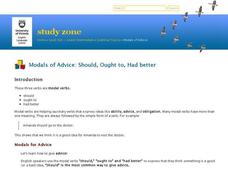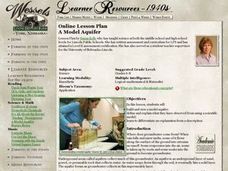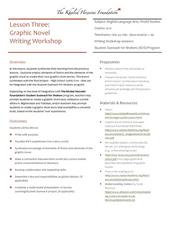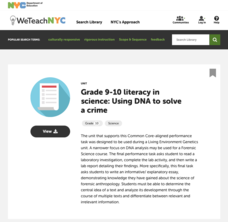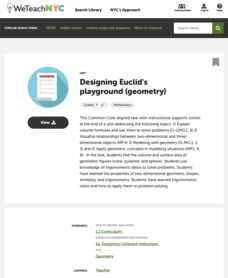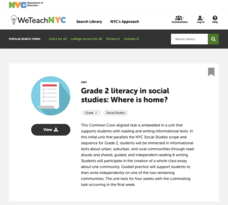Curated OER
Understanding the Indoor Environment: The Movement of Air
Young scholars discuss HVAC to assess prior knowledge. Students create a rubric to assess their modals of HVAC units, and build the models according to instructions and discussion by the teacher.
MENSA Education & Research Foundation
Pi Day Fun!
In this multi-faceted introduction to pi, participants perform a bevy of pi-related activities. Ranging from measuring household items to singing pi songs and reading pi stories, this fun and non-intimidating resource serves to bring up...
Council for Economic Education
Athens and Olive Oil
Athens had olive oil—and lots of it! However, it needed wheat from the Egyptians. Understanding how societies get what they need through advantage and trade can be complicated. A scripted role-play exercise and in-class production...
American Battlefield Trust
Pre-1861: Disunion
Nat Turner, John Brown, and Abraham Lincoln all played a key role in the run-up to the bloody American Civil War. Using a PowerPoint, timeline activity, and essay prompt, young historians consider the roles of these men and more to...
Curated OER
Listening for Meaning: Same Sound
Students listen to a taped conversation to help them learn the meaning of the contraction "d" with the words "had" and "would".
Curated OER
Actors, Artists, Storytellers, and Poets
Twelfth graders in groups select a human rights issues and create a presentation that examines it through art, storytelling, poetry, or acting. The lesson helps students use different modalities of learning. Student personal expression...
Curated OER
Should, Ought to, Had better
In this advice learning exercise, students fill in the blanks to sentences with the words should, ought to, or had better. Students complete 8 sentences total.
Curated OER
Caterpillars To Butterflies
Students observe the life cycle of a butterfly. They read butterfly/caterpillar themed books. They sequence the lifecycle from eggs on a leaf to an adult butterfly. They release their butterflies into a natural habitat after singing and...
Curated OER
Nonpoint Source Pollution in Long Island Sound
Students examine and identify the types of nonpoint pollution on Long Island Sound. In groups, they walk the shoreline, collect trash and identify its source. Using that information, they create a variety of graphs of the different...
Curated OER
A Model Aquifer
Students build a model that depicts how water is stored in an aquifer. They examine ways in which groundwater can become contaminated.
Curated OER
Swing Your Partner! It's A Virtual Square Dance
Learners explore the Wessels Living History Farm website and research how to do a square dance. They read a story, listen to an explanation of barn dances, and participate in various square dances.
Curated OER
Fertilizers & Grass Growth
Middle schoolers design an experiment to test the effects of common fertilizers on grass growth. They write or present a laboratory report responding to their observations and consider how fertilizers may affect the soil environment.
Curated OER
It's All About the Roots
Students investigate the process of hydroponic agriculture. They grow beans in different hydroponic solutions, compare results and graph their observations.
Curated OER
"Finding" Horsepower
Young scholars investigate horsepower as a unit of power. They examine history and discover that scientists and engineers of high achievement are considered to be among the most valued contributors to their culture.
Curated OER
Patriotic Music: Three Cheers for the Red, White & Blue
Students examine the patriotic songs of the 1940's and compare them to those of today. They identify elements that classify a song as patriotic, listen to several examples and complete Venn diagrams contrasting different examples.
Curated OER
Listen Up! Swinging with some Big Band Music
Learners read about the music and life of Glenn Miller. They listen to Miller's "Jeep Jockey Jump" and analyze the piece for instrumentation, formal structure and stylistic characteristics.
Curated OER
Caterpillars To Butterflies
Students gain an appreciation of nature by teaching them about the life cycle of the butterfly. They set up a terrarium so they can observe the changes a caterpillar goes through.
New York City Department of Education
Peter’s Garden
Watch scholars' understanding of fractions bloom. The resource presents a performance task where the fractions are equal parts from the same whole, and mathematicians must use them to solve problems about a grade level garden. Teachers...
Curated OER
Graphic Novel Writing Workshop
Khaled Hosseini’s video “Using Real People and Events” motivates learners to reflect on their own experiences and to use those experiences as the basis of a graphic novel that expresses a universal truth. The richly detailed plan...
ESL Kid Stuff
Intro ESL Lesson (Ages 8-14)
Introduce language learners to class behavior expectations, and each other, with activities that include greeting and name games, conducting a class survey, and creating a classroom rules poster.
New York City Department of Education
Grade 9-10 Literacy in Science: Using DNA to Solve a Crime
Scholars become detectives and use science to solve a crime! A complete unit introduces DNA and includes hands-on activities that have learners model DNA and extract it from different food types. A culminating activity challenges...
New York City Department of Education
Isabella’s Garden
Create rows and rows of vegetables. Pupils use their knowledge of multiplication to find the number of vegetable shoots planted in a garden and ways to arrange the vegetables in the performance task. Teachers use the suggested unit...
New York City Department of Education
Designing Euclid’s Playground
Create a geometric playground. Pupils work through a performance task to demonstrate their ability to use geometric concepts to solve everyday problems. The accompanying engineering design lessons show teachers how the assessment works...
New York City Department of Education
Grade 2 Literacy in Social Studies: Where Is Home?
What makes a community? How communities differ? Young scholars research different types of communities, small rural towns, and large crowded cities. They respond to writing prompts, and write essays in groups to understand the wide...








